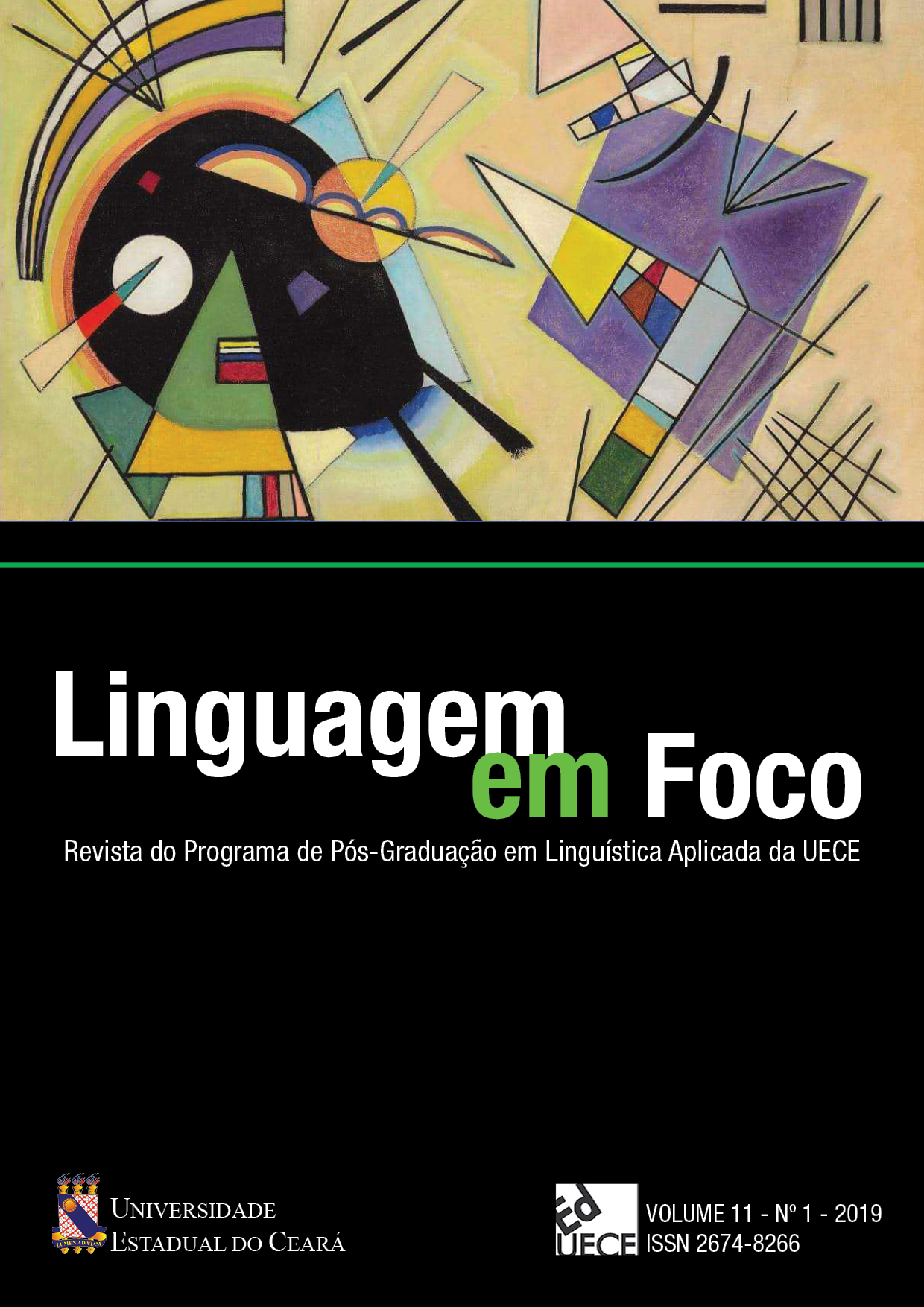A Prática da Escrita Literária e o Gênero Conto no Ensino Médio
Teoria e Análise de Prática
DOI:
https://doi.org/10.46230/2674-8266-11-2937Palavras-chave:
Escrita literária, Conto, Ensino de portuguêsResumo
Este trabalho discute o papel da prática da escrita do gênero conto na escola, bem como analisa o percurso metodológico do projeto Conto, recontos: novas histórias, o qual é uma coletânea de contos produzidos por estudantes de 2º ano do Ensino Médio. Baseado em estudos anteriores (REUTER, 1996a; TODOROV, 1979; et al), também sugiro uma descrição para o gênero conto considerando seu domínio discursivo, propósito comunicativo, estrutura composicional, conteúdo temático e estilo. Além de apreço pela leitura e escrita, esse projeto foi um meio para que os alunos reivindicassem sua postura como autores e sujeitos produtores de conhecimento e arte.
Downloads
Referências
AZZARI, E. F.; CUSTÓDIO, M. A. Fanfics, Google Docs...a produção textual colaborativa. In: ROJO, R. (Org.) Escol@ Conectada – os multiletramentos e as TICs. São Paulo: Parábola, 2013, pp. 73-92.
BOSI, A. História concisa da literatura brasileira. São Paulo, Cultrix, 2015.
CANDIDO, A. O direito à literatura. In: Vários escritos. 4ª ed. São Paulo/Rio de Janeiro: Duas Cidades/Ouro sobre Azul, 2004, pp. 169-191.
COMPAGNON, A. O demônio da teoria. Literatura e senso comum. Tradução de Cleonice Paes Barreto Mourão e Consuelo Fortes Santiago. Belo Horizonte, Editora UFMG, 2014.
COMPAGNON, A. Literatura para quê? Tradução de Laura Taddei Bandini. Belo Horizonte, Editora UFMG, 2009.
COSTA JÚNIOR, J. C. O gênero crônica e os resultados de sua prática em sala de aula. Revista E-escrita, V.9, 2018-2. pp. 94-107. Disponível em:
https://revista.uniabeu.edu.br/index.php/RE/article/download/3304/pdf, acessado em 12/01/2020.
DOLZ, J.; SCHNEUWLY, B. Gêneros orais e escritos na escola. Tradução e organização de Roxane Rojo e Glaís Sales Cordeiro. Campinas, Mercado das Letras, 2011.
KOCH, I. V.; ELIAS, V. M. Ler e compreender os sentidos do texto. São Paulo: Contexto, 2014.
MARCUSCHI, L. A. Produção textual, análise de gêneros e compreensão. São Paulo: Parábola, 2008.
REUTER, Y. Élements de réflexion sur la place et les fonctions de la littérature dans la didactique du français à l’école primaire. Revista Repère. Recherches en didactique du français langue matternelle, número 13, 1996a, pp. 7-25, Disponível em:
https://www.persee.fr/doc/reper_1157-1330_1996_num_13_1_2172 acesso em 12/01/2020.
REUTER, Y. Imaginaire, créativité et didactique de l’écriture. Revista Pratiques, número 89, março de 1996b, pp. 25-44. Disponível em:
https://www.persee.fr/doc/prati_0338-2389_1996_num_89_1_1766 acesso em 12/01/2020.
TAUVERON, C. De la lecture littéraire à l’écriture à l’intention littéraire ou comment construire une posture d’auteur à l’école. Anais do 9º colóquio de AIRDF, Québec, 26 de agosto de 2004, pp. 1-16. Disponível em:
http://www.colloqueairdf.fse.ulaval.ca/fichier/Symposium_Dumortier/Tauveron.pdf acesso em 12/01/2020.
TODOROV, T. As estruturas narrativas. Tradução de Leyla Perrone-Moisés. São Paulo, Editora Perspectiva, 1979.
TRAVAGLIA, L. C. A caracterização de categorias de texto: tipos, gêneros e espécies. Revista Alfa. Nº 51 (1), pp. 39-79. São Paulo, UNESP, 2007. Disponível em: http://seer.fclar.unesp.br/alfa/article/viewFile/1426/1127 acesso em 12/01/2020.
Downloads
Publicado
Como Citar
Edição
Seção
Licença
Copyright (c) 2020 José Carlos da Costa Júnior

Este trabalho está licenciado sob uma licença Creative Commons Attribution 4.0 International License.
Os autores que publicam na Linguagem em Foco concordam com os seguintes termos:
- Os autores mantêm os direitos autorais e concedem à revista o direito de primeira publicação. Os artigos estão simultaneamente licenciados sob a Creative Commons Attribution License que permite a partilha do trabalho com reconhecimento da sua autoria e da publicação inicial nesta revista.
- Os conceitos emitidos em artigos assinados são de absoluta e exclusiva responsabilidade de seus autores. Para tanto, solicitamos uma Declaração de Direito Autoral, que deve ser submetido junto ao manuscrito como Documento Suplementar.
- Os autores têm autorização para disponibilizar a versão do texto publicada na Linguagem em Foco em repositórios institucionais ou outras plataformas de distribuição de trabalhos acadêmicos (ex. ResearchGate, Academia.edu).





























